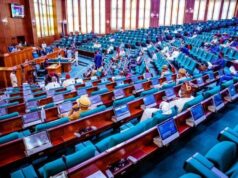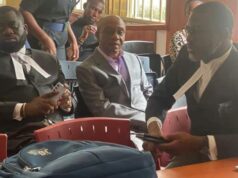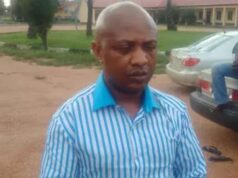
The National Judicial Council may on Friday send the names of 11 successful candidates to President Bola Tinubu for appointment into the Supreme, The PUNCH gathered on Tuesday.
It also gathered that 22 shortlisted justices were screened on Tuesday at the Committee Room of the NJC in Abuja from 9am to 6pm.
One of our correspondents learnt that the screened justices were divided into priority and reserved candidates.
The priority candidates include Justice Jummai Sankey; Justice Stephen Adah; Justice Mohammed Idris; Justice Abubakar Umar; Justice Chidiebere Uwa; Justice Obande Ogbuinya; Justice Ugochukwu Ogakwu; Justice Moore Adumein; and Justice Habeeb Abiru.
The names of the reserved candidates are Justice Muhammad Sirajo; justice
Ridwan Abdullahi; Justice Joseph Ikyegh; Justice Abubakar Talba; Justice Balkisu Aliyu; Justice Abdullahi Bayero; Justice Onyekachi Otisi; Justice Theresa Orji-Abadua; Justice Chioma Nwosu-Iheme, Justice Biobele Georgewill; and Justice Oyewole Kayode.
The apex court was reduced to 10 justices following the retirement of Musa Dattijo. His retirement came after that of Justice Amina Augie on September 22, 2023, and the death of Justice Chima Nweze on July 31, 2023.
The 10 justices at the Supreme Court fall short of the 21 stipulated by section 230(2) of the 1999 Constitution.
A source at the National Judicial Council, who spoke on the condition of anonymity, because he was not authorised to speak on the matter, told one of our correspondents that the names of the shortlisted justices were cleared by the various security agencies, including the Department of State Services, the police, before they were forwarded to the NJC.
The source said the names should be forwarded to the President after the NJC plenary.
Marathon screening
“The screening was done today (Tuesday). It started at 9am and lasted till 6pm. The screening of justices was held in the committee room of the NJC. Their names were earlier sent to security agencies for clearance before they came to the NJC.
“The interview committee comprising members of the council is the one conducting the screening for the shortlisted justices. That committee is headed by the second in command, which is Justice Kudirat Kekere-Ekun.
“The council will meet and the names of successful candidates will be ratified. After the plenary, the names of the ratified justices will be immediately sent to the President. The plenary should be concluded at most in the next two days,” the source explained.
According to the NJC guideline for the appointment of justices to the apex court, the Chairman of the Judicial Service Commission/Committee is expected to come up with a provisional shortlist on the merits.
The list is to consist of not less than twice the number of judicial officers intended to be appointed at the particular time and circulate the provisional shortlist together with a request for comments on the suitability or otherwise of any of the shortlisted candidates.
The list is then forwarded to the NJC for its consideration of each of the short-listed candidates.
The candidates who have been shortlisted shall undergo an interview to be conducted by the NJC to ascertain his or her suitability after which the names of the successful candidates are forwarded to the President.
The Nigerian Bar Association spokesperson, Akorede Lawal, declined comment when contacted.
He said the association would comment after the process had been completed.
SANs advise NJC
But a Senior Advocate of Nigeria, Ifedayo Adedipe, said the appointment process of justices in Nigeria should be thoroughly interrogated.
He said, “In the past, justices were taken from the academia and those who have practised for years.
“However, in recent years, the practice has changed in which justices from the Court of Appeal are elevated to the Supreme Court. I have no issues with that but it does not make for the visions that one would expect of the policies of a country.
“I think we could do with some academia at the Supreme Court and even some senior lawyers could be elevated to the Supreme Court and not necessarily Court of Appeal justices alone.
“Secondly, the National Assembly’s role in clearing justices for appointments is not encouraging. There are no interrogations. A committee should be made to invite and interview the justices. The appointment process needs to be interrogated.”
On his part, a professor of law and Senior Advocate of Nigeria, Prof Edoba Omoregie, said the committee should focus on proven knowledge of the law while making their recommendations to the President.
According to him, without the number of years, or even with more years in view, the person must have proven knowledge of the law.
Omoregie also stated that the second point for him was that the person must be a person of unimpeachable integrity.
He said, “You know, members of the profession also know what that means. Well, we know ourselves. So that every person who is not mentioned, everybody will agree that, ah, this is a person of capacity and integrity.
“And then finally, the person must not be known to support any political party. Any particular political party. It doesn’t matter that he’s not a registered member.
“There are some people who may not be registered, but the circle of their friends, those in the law, we know that it fraternizes the positions, one way or the other. Such people should not be appointed to the bench at that Supreme Court level. Because matters involving political disputes will come, and the person may express some bias.
“Even though that will be equal to fully expressing facts of the law in place. So for me, those are the three things I will focus on. Number one, like I said, must have proven knowledge of the law. Two must have impeccable integrity. And three, must be completely apolitical. That is the way I would like to look at it,” he said.
Also speaking, Prof Sam Erugo, SAN, said the criteria for the appointment of Justices of the Supreme Court must include competence and experience.
“I mean competence in terms of measurable legal knowledge, relevant legal skills, and essential values or ethics necessary to do justice according to law, “ he said.


















































